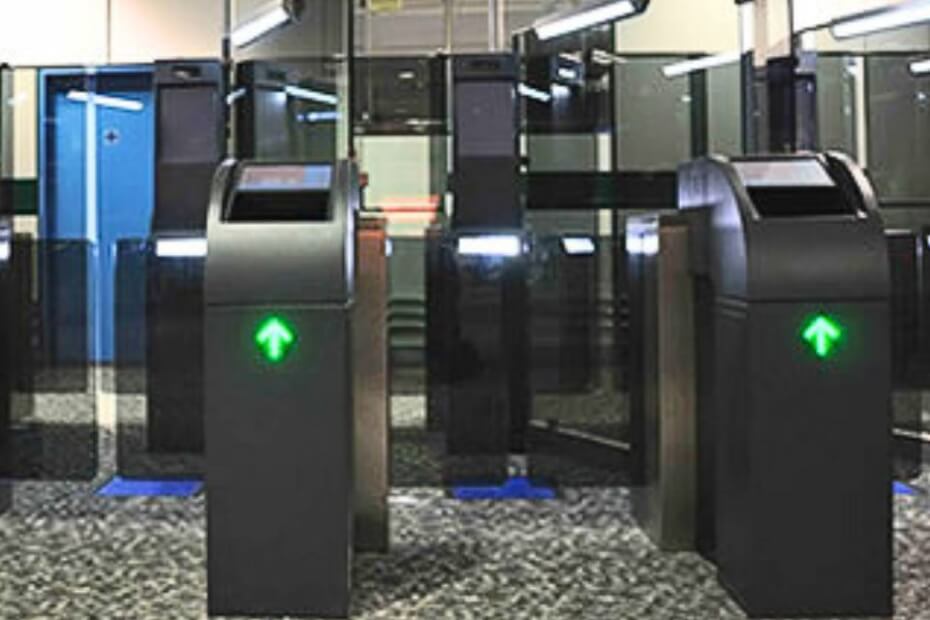
The recent nationwide electronic gates (eGates) failure has raised concerns about its potential implications once the new border check systems are in place.
This includes the broader implementation of the United Kingdom’s (UK’s) Electronic Travel Authorization (ETA) and the European Union’s (EU’s) Entry/Exit System (EES).
On the evening of 7 May, the UK’s major airports experienced more than four hours of eGate outages.
Passengers arriving at Heathrow, Gatwick, Stansted, Birmingham, Bristol, Edinburgh, Manchester, and Newcastle airports had to clear passport control manually.
Lord Foster of Bath, chairman of the Justice and Home Affairs Committee, said the Border Force staff must be “equipped and trained to deal with such situations.”
He added that “resilience in our systems is essential” as the UK prepares to roll out the ETA more widely.
“The government must get the fundamentals right,” Lord Foster said, as per the BBC.
“And it must be prepared to learn the appropriate lessons when things go wrong,” he added.
The ETA is the UK’s new digital travel permit system that will be mandatory for all non-visa nationals visiting the UK.
It is currently only mandatory for visitors from the Gulf bloc who previously required an electronic visa waiver (EVW).
Julia Lo Bue-Said, CEO of The Advantage Travel Partnership, an independent travel agent industry, said the UK should not rely too much on technology.
He urged the British government to invest in technologies that ensure border check “systems run smoothly.”
Lucy Moreton of the Immigration Services Union revealed they have repeatedly asked the Home Office for proper contingency plans.
She added that the government must have “robust contingency plans in place to avoid any unnecessary disruption to the traveler.”
However, Moreton said the recent eGates failure proved contingency plans are still lacking.
UK’s preparedness for the EU’s EES
Dan Jarvis, Labour Party’s shadow Home Office minister for security, pressed Tom Pursglove, the Minister for Legal Migration and the Border, about the eGates failure at the House of Commons on 8 May.
As per TTG Media, Jarvis asked Pursglove if he could “guarantee that full preparations are in place” when the EU’s EES rolls out later in the year.
Pursglove stated that “an enormous amount” of collaboration and “thorough engagement” has existed between the United Kingdom (UK), France, and the EU.
This is to ensure the UK has “the best possible plans in place” when the EES rolls out later in the year.
“We have made real progress in recent weeks, and we will continue to sustain that effort,” he added.
The EES is the European Union’s new automated border control system set to roll out in October 2024.
It will replace manually stamping passports at the EU’s external borders.
Instead, the system uses facial or fingerprint scans to record travelers’ movements in the Schengen Zone.
Its introduction has prompted warnings of long queues and delays at the UK-EU borders with juxtaposed controls.
Juxtaposed controls mean EU border officers perform immigration checks on UK soil.
Channel Tunnel operator Getlink assured that there will be no long lines at their terminals in Coquelles and Folkestone.
However, there are concerns of 14-hour delays at the Port of Dover and snaking lines at London’s St. Pancras Stations.
Transport Minister Guy Opperman stated that the EES rollout will undergo a six-month soft launch to ensure a smooth transition and address long queues.
Nationwide eGate failure left thousands waiting in long queues
There are 270 eGates across 15 UK air and rail ports, and it appears that they all stopped working on 7 May.
According to the Home Office, as soon as the engineers detected a broader network issue around 7:44 p.m., “a large-scale contingency response was activated within six minutes.”
Pursglove stressed that there was “no indication of malicious cyber activity” and that the outage did not compromise border security.
However, the nationwide eGates failure left thousands of passengers arriving in the UK waiting hours to clear passport control.
UK Border officers had to do passport checks manually until the eGates were back online shortly after midnight.
According to The Guardian, the eGates failure also “affected some policing, passport, and immigration systems.”
Pursglove “sincerely apologized for the disruption that occurred.”
He also assured “that every possible lesson is learned, to ensure that this does not happen again.”
Pursglove said the eGates failure was due to “technical issues within the Home Office network.”
He added that the Border Force had already found a permanent fix for the issue, ensuring it won’t happen again.
Replacing eGates with newer technology
The nationwide eGates failure is one of many that have caused significant travel disruption at the UK’s entry points.
Two weeks ago, another technical outage also caused long queues at Edinburgh, Gatwick, and Bristol airports.
In May 2023, UK airport and port passengers experienced lengthy delays due to another system software upgrade.
In the latter part of 2021, there were also three separate incidents of eGates failure.
Former chief inspector of borders and immigration David Neal had warned of the eGates’ ineffectiveness and inefficiency.
eGates were aimed to improve border controls, allowing a smoother and much faster immigration experience.
They use facial recognition technology to compare a traveler’s live image with the one stored in the passport’s biometric chip.
The Border Force plans to test a new, smarter eGates system that uses only facial recognition technology for contactless travel.
If proven successful, travelers would not need to bring out their passports when going through UK immigration checks.

